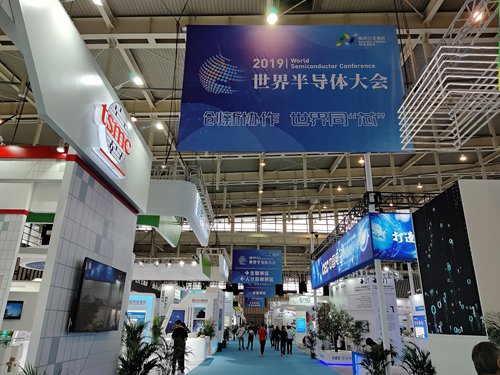SOURCE / INDUSTRIES
Japan-SK feud disrupts supply chain, sounding alarm for Chinese firms
Escalating tensions sound alarm for Chinese firms

The World Semiconductor Congress is held in Nanjing, capital of East China's Jiangsu Province in May. Photo: VCG
An escalating technology battle between South Korea and Japan will cause disruptions of components needed by technology companies, but the episode could mean opportunities for Chinese technology companies to move up the industry chain, analysts said on Sunday.
As US-led restrictions on technology exports to China have intensified, Chinese companies have been focusing more on internal development, and they are well-positioned to plug potential gaps left by South Korean and Japanese enterprises because of their conflict, they noted.
The feud between South Korea and Japan is running high, after the Japanese government imposed restrictions on exports of materials for high-technology equipment such as semiconductors and displays for electronic devices to South Korean companies, citing "significantly undermined" diplomatic trust.
South Korean officials have vowed to retaliate if Japan does not lift the restrictions.
The restrictions have had negative impact on the supply chain for semiconductors, and if their tensions worsen and more restrictions are imposed, "it could cause a very bad impact" on the industry, Xiang Ligang, director-general of the Beijing-based Information Consumption Alliance, told the Global Times on Sunday.
He said that China, South Korea and Japan have formed a closely intertwined technology supply chain. Japan provides materials, South Korea makes semiconductors and displays, and China assembles the final devices using those inputs, which are sold around the world.
"The cut on supplies for South Korean chips will not only have an impact on Chinese companies, but also the global industrial chain," Xiang said.
The two countries are far from resolving their trade tensions, apparently rooted in a decades-old dispute over compensation for South Korean workers forced to work for Japanese companies during World War II.
After a meeting in Japan on Friday failed to make any progress, Japanese and South Korean officials traded accusations about whether Seoul had demanded Tokyo drop the restrictions at the meeting.
The escalating tensions should sound the alarm for Chinese companies in the upstream of the industry chain to rise to the challenge and move forward, said Fu Liang, a Beijing-based independent industry analyst.
"[Chinese companies] are positioned to further move up and they should seize the opportunity," Fu told the Global Times on Sunday, noting that Chinese companies' capabilities have improved significantly.
Amid growing restrictions on sourcing foreign materials and equipment, Chinese technology companies such as Huawei have been investing heavily to reduce their reliance on foreign supplies. Chinese companies in various parts of the supply chain are cooperating to cope with external pressures and find alternatives, Xiang said.
For example, South Korea's exports of chips to China fell 15.9 percent year-on-year in May, according to South Korean official data.

